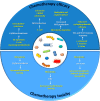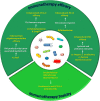Pharmacomicrobiomics: exploiting the drug-microbiota interactions in anticancer therapies
- PMID: 29789015
- PMCID: PMC5964925
- DOI: 10.1186/s40168-018-0483-7
Pharmacomicrobiomics: exploiting the drug-microbiota interactions in anticancer therapies
Abstract
Cancer is a major health burden worldwide, and despite continuous advances in medical therapies, resistance to standard drugs and adverse effects still represent an important cause of therapeutic failure. There is a growing evidence that gut bacteria can affect the response to chemo- and immunotherapeutic drugs by modulating either efficacy or toxicity. Moreover, intratumor bacteria have been shown to modulate chemotherapy response. At the same time, anticancer treatments themselves significantly affect the microbiota composition, thus disrupting homeostasis and exacerbating discomfort to the patient. Here, we review the existing knowledge concerning the role of the microbiota in mediating chemo- and immunotherapy efficacy and toxicity and the ability of these therapeutic options to trigger dysbiotic condition contributing to the severity of side effects. In addition, we discuss the use of probiotics, prebiotics, synbiotics, postbiotics, and antibiotics as emerging strategies for manipulating the microbiota in order to improve therapeutic outcome or at least ensure patients a better quality of life all along of anticancer treatments.
Keywords: Cancer; Chemotherapy; Immunotherapy; Metagenomics; Microbiota.
Conflict of interest statement
Competing interests
The authors declare that they have no competing interests.
Publisher’s Note
Springer Nature remains neutral with regard to jurisdictional claims in published maps and institutional affiliations.
Figures
References
-
- Panebianco C, Potenza A, Andriulli A, Pazienza V. Exploring the microbiota to better understand gastrointestinal cancers physiology. Clin Chem Lab Med; 2018. 10.1515/cclm-2017-1163. [Epub ahead of print] - PubMed
Publication types
MeSH terms
Substances
Grants and funding
LinkOut - more resources
Full Text Sources
Other Literature Sources




